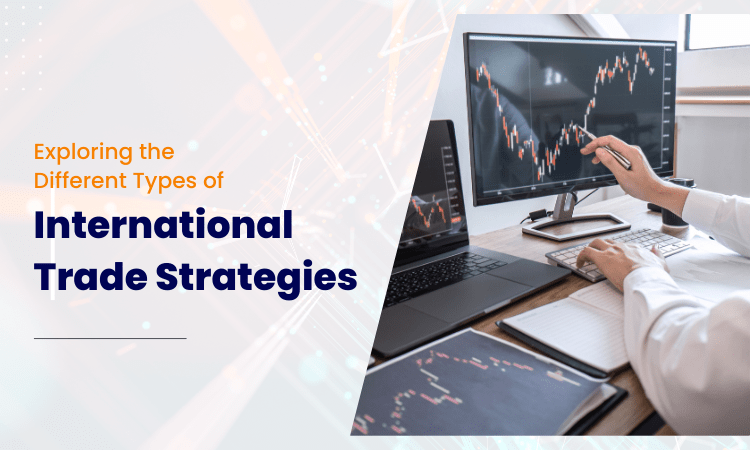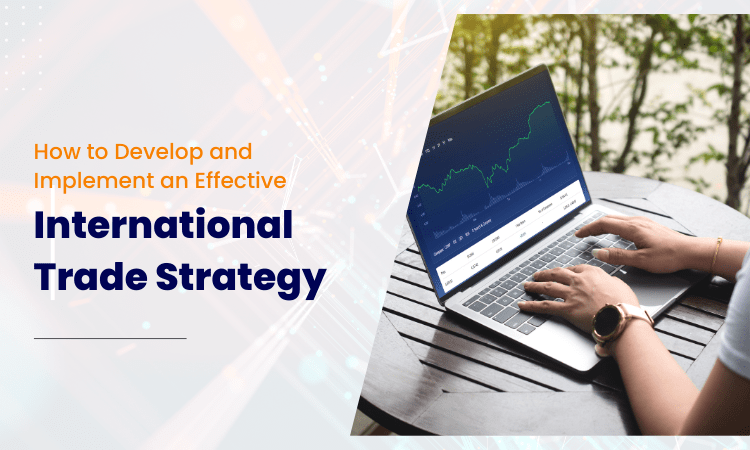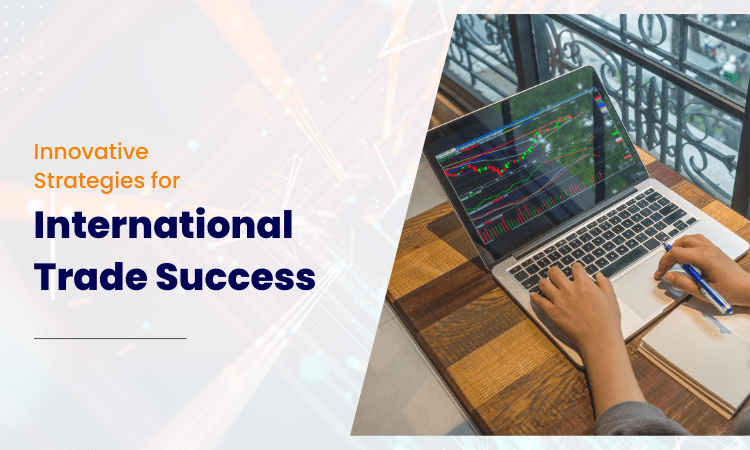Table of Contents
Introduction:
Nowadays, business activities across the globe have been highly involved in global economic integration. Therefore, international trading has become one of the important aspects of business in the world. The key to our success is in developing effective strategies that will enable us to address the challenges which are produced by the complexities and some uncertainties of international trade. This blog will uncover several types of trade policies that will definitely provide you with an understanding of the nature of trade and guide you on how to come up with an effective trade strategy for your business. Indeed, it is now our time to jump in and explore the principles and tactics for success in international commerce.

1. Exploring the Different Types of International Trade Strategies: A Comprehensive Guide:
Many businesses are attracted and, therefore, drawn to the opportunities of overseas trade by the fact that access to new groups of potential customers, and diversity of consumer bases, as well as the possibility of high economic growth. However, the traversing of the world of international business will need a carefully developed reflection. In order to be successful, conveying the entire idea of the various strategies of international trade is imperative.
Exporting:
The most fundamental approach is exporting. In this approach, your company is selling directly to the overseas market. It also becomes possible to have flexibility, expansion, and scalability without a lot of initial investments, but it comes with regulating certain factors, such as overseas taxes and logistics.
Importing:
Procurement of foreign supplies or materials could reduce input costs or enable your business to trade products which are not indigenous. Instead, we must factor in quality control, import duties, and fluctuation of exchange rates to have successful planning.
Franchising:
Simply realize your already working business model by local people, who operate under conformity and guidelines of your brand and be partners with them. It would create a contingency for fast growth of the brand but implies careful brand identification and franchisee classification.
Licensing:
Transfer this to another firm in exchange for royalties (for example, intellectual rights like patents, and trademarks). This not only draws demand but also utilizes brands for recognition, but the intellectual property should be tightly controlled.
Joint Ventures:
Collaborate with a foreign company to maximize the use of resources, human capacities and market reach. By pursuing this strategy, these consequences are avoided while making the most use of what local communities have to offer. Accountability, however, still requires clear agreements with the communities.
Direct Investment:
Register a company with its own rights and duties in the foreign market by opening wholly-owned subsidiaries or manufacturing sites. This provides ultimate flexibility and gives a strong market position, however, this option is fairly costly and involves a lot of risks.

2. Unveiling the Secrets Behind Successful Trade Strategies in International Business:
The international business realm is magnificent because of its scale in terms of markets and the kind of area of expansion that it is welcoming. There is no doubt that mastering the intricacies of multi-regional trade negotiations requires a highly delicate and well-constructed trade strategy. However, while the alternatives may be fitting, the situation is dynamic as the competitors are constantly entering and exiting the landscapes and it becomes difficult to choose. Fear not, intrepid entrepreneur! The following segment will unveil to you trade secrets that will give step solution to this journey of conquering the international market.
Delving into Trade Strategy Types:
Initially, determine which of the different types of trade strategies will be the best for your circumstances. One may be suitable for someone who is conservative, whereas the other will appeal to investors who seek more aggressive investments.
Exporting:
You can start by exporting your products or services directly to foreign markets which work generally very well with distances. They also have good brand recognition.
Importing:
In order to fill rising demand, use foreign suppliers for goods and services exported to the domestic markets. Such an approach is designed for forming transportation relationships and planning logistics correctly.
Countertrade:
Barter trade instead of using currencies and sometimes this is applicable in the country with a shortage of foreign currency for the payment of import bills.
Joint Ventures:
Together with a local firm, consolidate efforts to create a joint venture project which will use its extensive market knowledge and support in cultural adaptation.
Licensing:
License to the foreign business without the need to have either direct investment or intellectual property (patent or trademark) is a good option as it provides global access for a fee.
Choosing Your Trade Strategy Arsenal:
The ideal way systematically depends on various factors. Consider the sector that you fit in, your target market, resourceful talents and Porter’s upcoming opportunities. The volatile nature of emerging economies requires you to be cautious of the risk.
Market Research:
Thoroughly research the above-stated target market and those that exist, by measuring their compliance level with regulations and the competitor landscape. Thus, it is the groundwork upon which other decisions related to the matter can be carried out.
Risk Management:
Create plans to tackle risks relating needs of foreign currency, politics, and culture.
Cultural Sensitivity:
Discriminate your product by assimilating distinctive cultural attitudes with business operations related to your target market. Trust and the willingness to build rapport is the most important for long-term success.
3. Navigating the Global Market: Tried and Tested Strategies of International Trade:
No need to talk about marvellous trade with foreign countries is worth noticing. Beyond frontiers, new markets, a widespread customer base and enormous exponentiation of business opportunities wave the flag of global negotiation attracting more people from diverse business backgrounds. Both the benefits and challenges that come with taking our business to the global arena should be well understood. Searching for operational issues and policies, as well as what marketing is easy turns into selling your product, is hard. Nevertheless, certain strategies through which success is accessible are encouraged. Well, what are the intricacies and things that you as a businessman or a woman need to know in order to better engage in international trade and to discriminate the respectful business venture? Here are some tried-and-tested strategies to guide your journey: Here are some tried-and-tested strategies to guide your journey:
Know Your Market:
Conduct extensive research on your target market at the beginning. Learn the area of your market, the kind of customer desiderates and the type of competitors. Make use of reliable channels such as the International Trade Administration (ITA) and local associations to gain inside information.
Choose Your Entry Mode:
These diverse types of possible exporting vary from direct exporting to strategic partnerships. Evaluate variables like market size, trader mindset and resources you possess in order to identify the most suitable way that would work best for your company.
Embrace Cultural Sensitivity:
Recognition and respect for different cultural traits are the primary steps towards the situation of need for trust and communication in the international markets. Adjust your marketing tools, approach to communication, as well as any product offerings in a way that talks to the local consumers.
Build Strategic Partnerships:
Right partners will share their up-to-date information about operating within the regulations, and conduct logistics and cultural considerations during the process. To be able to include agreements concerning joint ventures, distribution, or market alliances, you need to have one foot in a new market.
Prioritize Compliance:
International trade embodies a spacious net of regulation systems, tariff barriers, and customs procedures. Maintain compliance with the applicable regulations to achieve the fastest time frame and to avoid penalties and reputation damage.
Leverage Technology:
The Internet and IT support the globalisation of trade by optimising communication and marketing, logistics, and payment systems. Employ digital tools to increase efficiency, openness, and the span of your market everywhere in the world.
Stay Agile and Adaptable:
The international business environment lies in the dynamic process. Be able to flex your strategies to counteract economic, legal and demographic shifts. Adaptivity and Commitment are important constants of success when and over a long-term period.

4. How to Develop and Implement an Effective International Trade Strategy:
There are many more opportunities in the world than you can handle and with the right preparations, you can delve into the global markets successfully. Tactical skills stay steady like a compass he/she uses to navigate cultural intricacies, legal requirements and competitive relentlessness. This is how to set yourself up for success:
Assess and Align:
And it should be the first thing of the day to know better about yourself and to recognize your inner strengths and resources. Are you up to the task of moving and storing more than before? Are the funds available to implement the required expansion? Consistent with your global business aspiration, you have to connect them with your core strengths, and limitations, as well as conduct a feasibility study.
Target with Precision:
The online messages that are sent to a large number of people in order to catch a single fish should not be entirely disregarded. Conduct a market study in order to determine the country with loyal customers, good regulations, and favourable conditions that will well be running your business smoothly. Consider the concentration of the markets on the top markets with the maximum sales for your items or services.
Dive Deep:
Cultural Intelligence: Cultural sensitivity is key to this challenge. In this way, you will help to understand them better: local customs, the preferences of the consumers, and channel styles of communication. Custom-tailor your marketing, packaging images as well as product features for the niche market you are targeting at.
Choose Your Mode of Entry:
The universe is your personal cannonball, but you are the only one who can indulge in it and absorb the beauty of it. Choose whether you will ship the product directly, work with regional distributors or even set up your own local presence. The given sentence has been shortened and restructured to make it more clear and impactful. Each method (cough type) will have its (cough) wins and losses, so be careful and choose the right approach based on what (most) is available to you and your market understanding.
Navigate the Regulatory Maze:
The stability of the global market is a critical factor for successful trading as it is an inherently unpredictable force. Always be ready to adapt your tactics to the transitions in the categories, regulation alterations, and consumer preferences, Training development and the flexibility to accept change will always contribute to success.
Invest in Technology:
Technology is a good friend when you’re in the global stage. Digital tools such as social media, emails, and visual content serve the purposes of fast and effective communication, smooth supply chain management, and direct marketing campaigns. Platforms such as e-commerce online stores and mobile money can provide an opportunity for the business entity to reach out to new customers and efficient transactions, respectively.
Trade between countries is not about the pieces you have or the items you offer, but the issues your business faces as you deal with the labyrinthine regulations, tariffs, and customs requirements. Go for collaboration with professionals or use expert services and this will unwaveringly keep you on the right track as far as the legal area is concerned.
Build Your Support Network:
A lonely island cannot be found in the international trade network of the modern world. A man cannot be alone here. Establish networking with the local project owners, associations and authorities. What they do, is they utilize their experience, as well as, their findings for the sake of the cultural differences intricacies and barriers.
5. UNO's International Trade Strategy: What You Need to Know:
An elaborative but simple advisory will help you stand out from your competitors and achieve your goals in this complex trade world. Welcome UNO International Trade Strategy, the globally recognized expert in world trade consulting, taking a distinct approach to dealing with the macro-market. English and Russian are relatively similar in some aspects, but what exactly makes them different? Now, we shall take a quick tour of the UNO strategy and why this may be the most ideal roadmap for your growth goals.
Multidisciplinary Expertise:
Forget cookie-cutter solutions. Among UNO’s staff are highly qualified experts who represent different academic and professional backgrounds, such as customs law, economics, international logistics, and cultural exchange domain. Through this approach by all the disciplines, you may be able to provide custom advice which takes all the aspects of your journey into consideration.
Focus on Market Access:
In terms of market research, this is key to UNO’s strategy. In many ways they develop beyond that, excavating into diverse geographical conditions, regulatory obstacles and adversary forces. Consequently, a thorough and precise study will provide you with the ground to go into the market, knowing everything about it and thus decreasing the risk of expensive wrong steps.
Strategic Partnerships:
Undoubtedly, tackling issues alone can be an exhausting prospect. Although UNO has a broad network of local partners, distributors and government agencies, it connects you directly with those partners. The collaborations give you the priceless backing for crossing cultural barriers which hence plant you firmly in the target market.
Tailored Trade Remedies:
Trade disputes can become as challenging, if not more costly, as they are intricate. UNLO deals with trade remedies and the means with which you can counteract the unfair competition which happens in the international setting. You stand a chance of being safe once we defend your interests in the international arena.
Capacity Building:
Knowledge is power. UNO’s customized classes, which are tailored to the specific needs of your employees, will ensure that they are fully equipped with the required tools, techniques, and knowledge to successfully navigate international trade negotiations. This helps in creating your internal capacity for the long-term since it strengthens your family bonds and your playful nature makes you multi-faceted.
Beyond Borders:
Every student deserves to be accepted and treated with respect, regardless of their race, religion, and culture. They realize technology, which is of great importance in today’s trading environment, is playing a greater role in trading. They are up to the capability of integrating digital tools and e-commerce platforms to facilitate working in a way that helps you to be efficient in reaching new markets easily.

6. Key Components of a Winning International Trade Strategy:
Entering the global market for your business is a journey which can be quite rich, albeit with notable wraiths. A solid and versatile global trade strategy to avert mistakes or overcome obstacles in the course of operations is as vital as ever. Here are the key components that will turn your strategy into a winning formula: Here are the key components that will turn your strategy into a winning formula:
Market Selection:
Instead of trying to be “with a little bit of everything” you are better off sacrificing something and giving all your time to one thing. Do detailed market research to find that match just the marketers you want to market your product and the ones who are in your target market. Also, those that are accepting of your consumer users and the environment you are operating in are favourable. First of all, a good strategy is to concentrate on those markets where there is a maximum opportunity for the specific products or services that you offer.
Cultural Intelligence:
A culture isn’t limited to one language. It’s all about grasping what is common among local people. The culture they have and what they prefer and supply as customers. Allocate resources to the cultural competence development of your team. Also, listen to consumer trends, and this will inform you on how to modify your marketing, packaging, and even product design to suit your target market.
Entry Mode Selection:
From the different ways to reach your target market, pick out the method that will work best for you. Those options are direct export, coupling up with local distributors, worship, and building of a local establishment. The truth of the matter is that each of the methods has its upsides and downsides. The people who move into the trade business need to know what direction is suitable for them to start a business while taking into consideration their budget, market size and risk tolerance.
Compliance Expertise:
Global trade comprises an intricate web of regulations and procedures that surrounds national customs as well as tariffs. Partner up with the experts or suggest you need to capitalize on the specialized resources, for instance, to help avoid any lack of understanding of the legal terrain. If the regulation mandates adherence, penalties should be expected. The consequences should be anything ranging from delay in operations to reputation loss.
Agility and Adaptability:
Do not be convinced that a one-size-fits-all plan will be a potent weapon in the battle for the global market. Get yourselves ready by adopting a flexible mindset as things change with time ranging from fads to regulations and consumer choice. Learning and being able to adapt is found to be the main factor amid succeeding in the long-run.
Technology Embracement:
In the modern era of connectivity where technology has been heavily integrated with every aspect of life, we find tech as our international trade friend. Utilize a digital tool for efficient communication, the streamlined operation of logistics, and the carrying out of targeted marketing campaigns. All kinds of services ranging from a simple e-commerce store to online payment system may help to transform a business and attract new customers.

7. Achieving Long-Term Success in International Trade: Essential Strategies:
To successfully conquer the foreign market is not merely a sprint finish; it’s a strategic marathon requiring one’s persistence and ability to quickly adapt. To find the connection between success in a vibrant market more than simple guidance for a short period. Here are essential strategies to navigate the journey and thrive in the long run: Here are essential strategies to navigate the journey and thrive in the long run:
Focus on Building Relationships:
The significance of international trade isn’t just about commodities, it is also about ties between countries. Build stable ties with business institutions in the neighbourhood (local partners, distributors etc) and even with your competitors. Additionally, these ties prove crucial in inspiring understanding, cross-cultural communication and friendship that promote shared interests.
Invest in Continuous Learning:
The global setting is perpetually undergoing new variations. Get ahead of the competition by actively updating your skills on the relevant regulations, innovative technologies, and fast-changing consumer tastes. Attend industry events, introduce experts to your team, and make sure your team members have ongoing learning opportunities.
Adapt Your Strategy, Not Your Values:
Sensitivity induced by cultural issues should be considered as the main factor for the improvement. In your communications, be cautious not to translate word-for-word the way you would in the local market; keep the message general enough to resonate with the new region, but keep the essence of your values and branding intact.
Prioritize Sustainability and Ethical Practices:
Responsible business practices gain more importance as consumers tend to focus on the social and environmental risks in supply chains more and more. Make sure that sustainability and ethical sourcing are among your key tenets in the international trade strategy. Create your own voting system Customers who are aware foods are healthy and better for the body boost sales, increase brand loyalty, and minimize risk in the long run.
Foster a Culture of Innovation:
A swiftly moving market, like a car, which is unable to step on a gas pedal will always head backwards. Invite innovation into your group, showing different modes of technology, product designs, and markets that continue to deepen into new possibilities. Advertise the prudent risks and build a work climate which loves creative problem-solving.
Measure and Refine:
Lose no chance to get enlightened on the situation. Monitor your international trade success indicators and always be guided by the result it depicts for the next steps to be planned. Make sure you refine your strategy as you move forward, based on the information and consumer reviews to stay on track with your long-term goals.
8. Mastering the Art of International Trade: Proven Strategies for Sustainable Growth:
The allure of international trade beckons: new regions, a highly eclectic audience, and fast rate of expansion. Join us on this breathtaking tour through our picturesque cityscape. While participation in the world stage calls for more than mere ambition, the gains from such an engagement are also enchanting. International trade consists of all these: Intermediate planning between the cultures and openness to adaptable strategies – the art of international trade. Here are proven strategies to navigate this vibrant arena and cultivate sustainable growth: Here are proven strategies to navigate this vibrant arena and cultivate sustainable growth:
Cultivate Global Mindset:
Ditch the “one-size-fits-all” approach. Tap into the cultural differences, getting all the necessary information via market research, and go on with parsing product offerings, marketing messages and communication up to the point, when people of each target public empathize with what you say.
Forge Strategic Partnerships:
The foundations of power nationwide are based primarily on the strength of local partner and distributor relationships, and even competitor relationships. Application of their professional knowledge, involvement in professional clusters, as well as cultural sensitivity, can assist you in overcoming the gap and reaching the set-up heights.
Master the Multifaceted Dance of Compliance:
Internationalized trade necessarily goes with mastering the intricacy of various regulations, tariff rates, and import and export procedures. Been partnering with experts or drawn on specialized resources to make sure transition sailing and escape costly perils.
Embrace Technology as Your Ally:
Technology-driven business success abroad emanates from four main areas: communication and logistics are automated, new markets are accessed, and e-commerce platforms are availed. Resort to digital skills to prevent the emergence of any inherent inefficiency, along with a lack of transparency and market reach.
Build an Agile and Adaptable Strategy:
The global world – apart from all other clichés – is as dynamic as the beast, one can even say as difficult to tame. Having due flexibility, deploy an adaptive strategy that is responsive to the changes of regulatory modifications, new trends, and customer demands. Lastly, perpetual learning and application of acquired skills are your two best survival tools.
Prioritize Sustainability and Ethical Practices:
Nowadays consumers call for firms’ duties for the environment. Achieve an integrated approach to sustainability and ethical sourcing in your global strategy. Such as this helps to attract very conscientious market players; in addition, it manages the company’s risks in the long run and offers customer loyalty.
Invest in Continuous Learning and Cultural Immersion:
Never stop learning. Plunge into local pockets of ancient customs, get to know local mindsets, and stay ahead in the competitive race of the industry by attending events, seeking advice from experts and enjoying the journey!
9. Game-Changing Strategies for Thriving in Today's International Trade Landscape:
The international transaction process is reshaping into pieces. The state of play is characterized by protectionist movements, digital disruption, and increasingly complex consumer behaviour that although difficult to cope with, if not handled properly, can easily get a business out of the picture. However, for the hearty traders among us, there is no need to get scared! Here are some game-changing strategies to help you navigate this dynamic terrain and thrive: Here are some game-changing strategies to help you navigate this dynamic terrain and thrive:
Embrace Omnichannel Agility:
In the past, having a sales position in a call centre or a retail store was the only two choices available. Modern-day shoppers have diverse shopping habits as they consider both online and offline experiences as a norm. Seamless integration between e-commerce and physical stores, click-and-collect options and utilizing social media for cross-border targeted marketing will be the major market expansion strategies.
Think Beyond Borders, Think Beyond Products:
What is in front is not the goods anymore, but the services. Provide post-sales support, or training programs, or even data-driven insights in order to extend beyond your only product. This not only helps to increase the number of satisfied customers but also offers potential profit-making streams.
Hyperlocalize Your Approach:
Don’t just translate, transform. Incorporate cultural nuances into your marketing messages, product features, and packaging by adjusting to local sense of culture. Invest in language localisation and culture-sensitive training for your team.
Leverage the Power of Niche Communities:
Forget mass-market strategies. Pick niche groups and address pain points or unique wants from those particular communities. Make use of social media communities, and online forums, as well as influence marketing to engage precisely the interested communities directly.
Partner with Disruptors, Not Dinosaurs:
Look for partners who are creative and who are also striving toward the same goal as you. Cooperate with nearby startups, tech firms, as well as rivals to acquire and explode with the recent tech and unearth new markets.
Build a Sustainable Supply Chain:
Throughout the last few years, consumers all over the world became aware of the environmental and social implications of their decisions. Make your supply chain as clean as green by including sustainable practices, buying ethically and communicating a commitment to clarity.
Embrace Data-Driven Decisions:
Do not burden yourselves with the necessity for gut feeling. Get insights into your prospective customers, how they behave and the degree of your efforts’ success with the help of data analysis. Make data-based decisions in order to expand and grow in an informed way.

10. Unlocking Competitive Advantage: Innovative Strategies for International Trade Success:
The aura of the global trade surroundings is full of possibilities, but an extremely low level of competition, which requires strategic breakthroughs. To gain a foothold in the world marketplace with your brand requires strategic manoeuvres that allow you to get access to growth and success that are sustainable. Here are some game-changing approaches to leave your competitors in the dust: Here are some game-changing approaches to leave your competitors in the dust:
Hyper-Personalization Beyond Borders:
Ditch the one-size-fits-all approach. Seize the opportunities presented by data analytics and cultural knowledge by tailoring your messages to customers from different markets, develop a personalized approach, and adapt your customer service to their needs. This is not just an understanding but also a deep know-how that helps to build loyalty and position the brand as an optimal and wide solution to probably fast-increasing customer needs.
Embrace Disruptive Collaborations:
Don’t just compete, co-create! Collaborate with local startups, tech companies and even imperceptible competitors. According to the given sentence(s), the author is trying to say that: The author encourages partnering with local startups, tech companies, and even seemingly unlikely competitors. Such efforts can uncover several cutting-edge technologies, marketplaces, and innovative solutions to ease your work and put you ahead of the competition on the next level.
Think Services, Not Just Products:
Expand your value proposition. Provide the customer with after-sales support, training programmes or data analysis in addition to the base offer to build loyalty. It adds to strong customer relationships that are recurrent in nature increasing sustainable competitive advantage and separating your company from the product-oriented competitors.
Sustainability as a Strategic Weapon:
Consumers are increasingly eco-conscious. Sustainable principles must be included in your supply chain, as best you can, source ethically, and confirm responsibilities that are shown in social and environmental aspects. This builds a loyal nature of customers that not only helps in attracting aware customers but also decreases the risk of loss and builds brand recognition.
Agility is Your Superpower:
Global marketplace, otherwise known as the ‘beast’ is a dynamic one and often one that is tough to deal with. Develop and ingrain agility within your team culture. Improve on new strategies, include well-thought-out risks and get ready for an ever-evolving business environment. Being agile gives you the right to grab the ball at the foot of the goal and this is before the others can see it coming their way.
Cultural Intelligence is Your Secret Weapon:
Go beyond translators. Investing in CIP along with training for the team is important. ## Which Eco-friendly Packaging Solution Suits Your Product? Acquaintance with culture and visiting officials helps to build trust, doesn’t allow you to spoil somebody’s national traditions and customs and gives you the possibility to navigate the market with confidence.
Leverage the Power of Communities:
Clarify the identification and collaboration with micro-communities on social media platforms and online forums. Propose specific solutions, contribute to conversations and foster good connections. In the modern, time-constrained environment we live in, society often feels overwhelmed by the piling demands on our attention. The constant stream of news, social media updates, and entertainment options can leave us feeling disoriented and distracted. We find ourselves constantly jumping from one task to another, without fully immersing ourselves in any single experience. In this article, These groups will thus forge the way for the brands, give birth to new markets and crucial input about the customers.
Data-Driven Decisions for Global Domination:
In my opinion, don’t be advised to gamble with gut feeling. Apply analytics to follow the customers’ behaviour and know the market orientation as well as measure the performance of the marketing strategies. Data-based light-up rational decisions, you will use them to make intelligent choices and not to make a debilitating mistake.
Invest in the Power of Storytelling:
Hold global viewers’ attention through stories that resonate with so many different cultures. Use brand values to appeal to the customers emotionally, show your community impact and just make the customers feel connected with you. Storytelling leverages trust cultivates brand loyalty and defines your image as an expensive competitor.
Seek Expert Guidance:
Don’t make the intricacies of international trade unwise for any reason to face. Agree with the experts and create a partnership with well-known international trade strategy consultants like UNO International Trade Strategy. Needing to know various markets, compliance, and cultural differences may be challenging. However, having skillful representatives helps you during the entire process and speeds up your way to becoming a world-wide known brand.
Conclusion:
It is not very important to implement effective strategies if international trade is flourishing. The realization of the Shades of international trade policy including that of the UN on the other hand can bring up a business competitiveness wave. Through the creation of these strategies, companies can successfully meet the complexity of operations and maximize the achievement of the objectives of the company. By preparedness to change tack and a disposition to adapt, organizations are likely to create a new source of income which will, in turn, contribute to their sustainable growth in the global marketplace.

